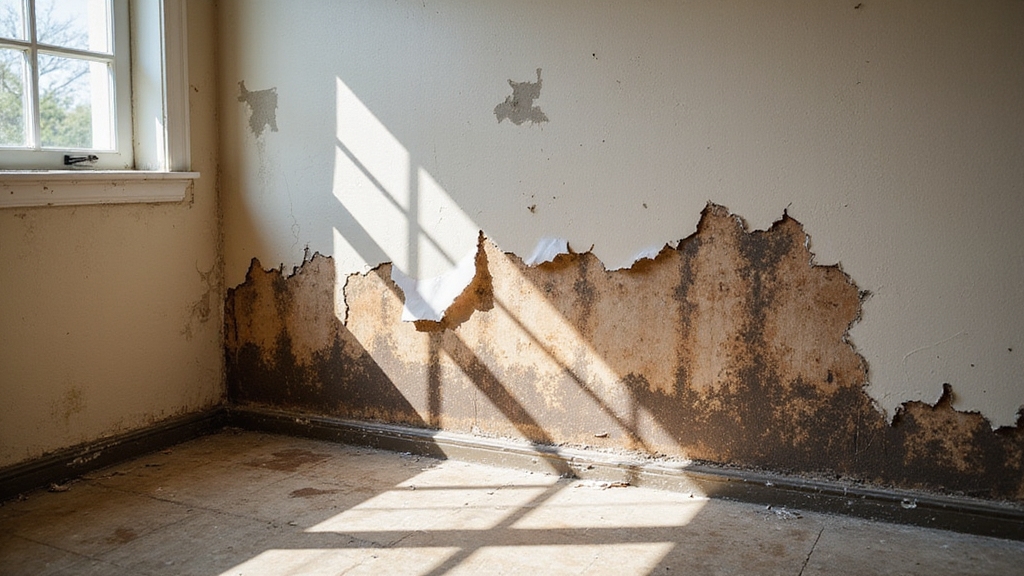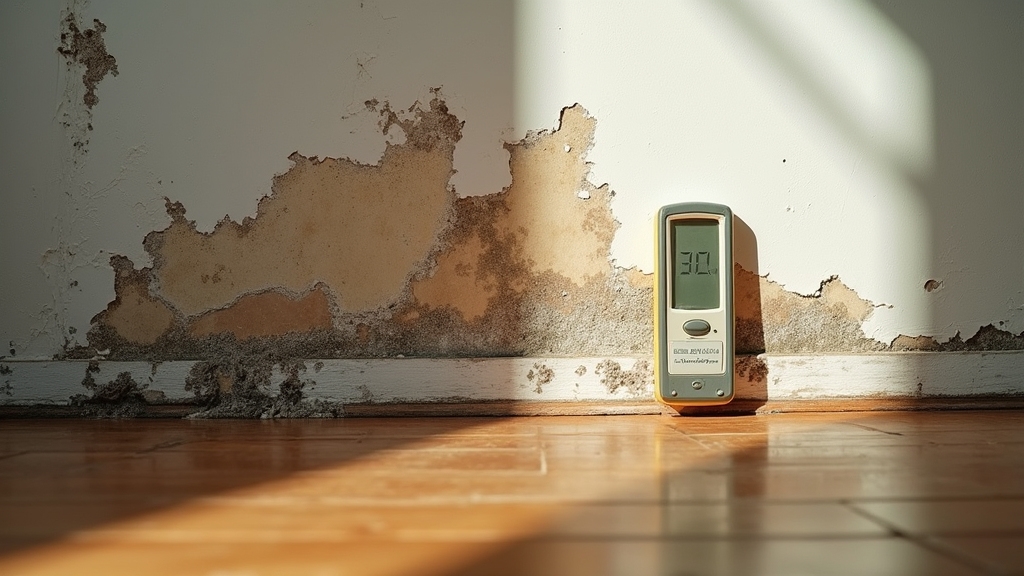Selling a house with water damage can be a tricky process. Water issues can harm your property’s value and make buyers nervous. Many sellers worry about what they must reveal to avoid legal trouble.
If you hide water damage, you could face lawsuits or lose the sale. Some sellers try to make quick fixes and hope buyers do not notice.
However, this approach can backfire and lead to bigger problems later. You must legally disclose any water damage or related repairs when selling your house.
Honest disclosure protects you and builds trust with buyers. It also helps you avoid costly legal disputes. This blog will guide you on what to disclose and how to avoid legal issues when selling a house with water damage.
Understanding Water Damage and Its Impact on Property Value

Water damage can lower a property’s value right away. Buyers often see it as a sign of hidden problems. If water damage exists, repairs and cleanup are usually needed before selling. Additionally, unresolved water issues can sometimes lead to liens, such as mechanic’s or tax liens, if unpaid bills or taxes are involved. Water damage may cause mold and weaken the building.
Appraisers usually reduce the property value if there is water damage. Buyers, lenders, and inspectors may look more closely at homes with past water issues. Conducting a thorough title search can help uncover any unresolved issues related to water damage or previous claims. If you do not disclose water damage, you could face legal or financial trouble. Marketability will likely drop if buyers worry about previous water problems. The final sale price may be lower due to these risks.
Legal Definition of Material Defects
A material defect is a problem that affects a property’s value or safety. Laws often require sellers to tell buyers about these defects. Water damage is a common example of a material defect.
A material defect is any problem that impacts a property’s safety or value, and sellers are usually required by law to disclose these issues.
You must share water testing results if you have them. This includes both good and bad results, especially if water is contaminated. Buyers need this information to make safe choices.
Sellers should also report any past insurance claims for water problems. These claims may show that the property has ongoing issues. Buyers can use this history to decide if they want to buy.
If the property has leaks or water seeping into the foundation, you must disclose them. These are serious problems that can affect safety and value. Always give full details about these defects.
State and Local Disclosure Requirements

You must comply with mandatory disclosure laws, which often require you to report any known water damage when selling your property. These obligations can vary significantly by state and municipality, so it’s crucial to understand the specific regulations in your jurisdiction. You’ll also need to prepare the appropriate documentation, such as standardized disclosure forms or affidavits, to ensure full legal compliance.
Additionally, understanding the termite threat and potential damage it can cause helps you accurately disclose property conditions and avoid future legal or financial complications. Being aware of the stepped-up basis rules can also influence how water damage impacts your tax liability after sale.
Mandatory Disclosure Laws
Mandatory Disclosure Laws require sellers to tell buyers about any property defects, including water damage. If you know about water issues, you must tell the buyer. This is a legal requirement in most states and cities.
Sellers should list all known water damage, whether it is old or new. If you have inspection reports or repair receipts, you should share them. Buyers must get these details before the sale is final.
If you do not disclose water damage, you could face legal trouble. The buyer might cancel the sale or ask for money back. Following the law keeps both sides safe.
Regional Variations Explained
Regional disclosure laws for water damage and sewer backup are not the same everywhere. Each state or city sets its own rules. Some places require detailed information, while others only need current problems reported.
California asks sellers to disclose both hidden and past issues, like old sewer backups. Texas only requires reporting of unresolved problems. Local rules can be even stricter, especially in areas with frequent floods.
You must check your state and local disclosure laws before selling your home. If you do not follow them, you could face legal trouble. Always make sure you understand what must be shared about water damage and sewer issues.
Required Documentation Overview
Sellers must give buyers documents about any water or sewer damage. Laws require you to share details about both old and new issues. If you leave out important facts, the buyer could cancel the contract or sue you.
A typical disclosure packet includes several items. The Seller’s Property Disclosure Statement lists all known water problems and repairs. Sellers must also provide receipts or inspection reports about repairs.
Municipal forms may be needed if local rules require them. These forms could mention tax changes or title search results. If water damage affects taxes or ownership records, you must disclose this.
The Role of Seller Disclosure Statements

You must comply with required disclosure laws by accurately completing seller disclosure statements, especially regarding water damage. Failing to disclose material defects or omitting known issues constitutes a common legal pitfall that exposes you to liability. If you don’t provide full disclosure, you risk contract rescission, substantial damages, or even allegations of fraud.
Required Disclosure Laws
State laws require home sellers to follow specific disclosure rules. These rules say you must share any water damage in your home. If a seller hides this, they could face legal trouble.
A seller must fill out a disclosure form honestly. This form asks about past water leaks, repairs, and insurance claims. Buyers need this information to make safe choices.
If water damage caused mold or hurt the building’s structure, you must report it. Environmental problems like these can affect health and safety. Full disclosure protects both the seller and the buyer.
Common Disclosure Omissions
Seller disclosure statements often have missing or incomplete information. Common omissions include past leaks, water intrusion, or drainage issues. Sellers sometimes skip details, thinking minor problems do not matter.
If you leave out facts about water damage or repairs, buyers may find these later. This can cause legal disputes. Accurate disclosure is important to avoid problems.
Legal rules require you to share all issues that affect a home’s value or safety. If you are unsure, it is better to include the information. Full and honest disclosure protects both sellers and buyers.
Implications of Non-Disclosure
Not telling buyers about water damage can lead to serious problems for a seller. If you hide this information, you may break state laws. Buyers can hold you responsible if they find out later.
Courts may say you committed fraud or misrepresentation. You might also breach your contract with the buyer. These actions can bring legal consequences.
If buyers sue, you could pay for repairs, legal fees, or even lose the sale. You might also face extra penalties if fraud is proven. Insurance companies may refuse coverage if you failed to report past claims.
Always share any history of water damage or repairs with buyers. Being honest helps you avoid legal trouble. It can also protect your finances and reputation.
Identifying Past and Present Water Intrusion
Water intrusion can lower a property’s value and cause legal issues. Sellers must check for both old and new signs of moisture. If you find damage, it is important to know if it is from the past or still happening.
Look for water stains, warped materials, or repaired areas to spot past issues. Use tools like moisture meters or infrared cameras to check for current water problems. If your property is in a flood zone, you may have extra disclosure rules to follow. Additionally, understanding the significance of homeownership challenges can help in assessing and disclosing water damage properly. Recognizing potential liability risks associated with water issues is crucial for legal compliance.
Keep records of all repairs, flood zone reports, and any cleanup work. This paperwork can help you prove what issues have been fixed. Accurate information protects you during the sales process and helps you meet legal requirements.
Mold and Mildew: Health Hazards and Legal Risks
You must fully disclose any known mold or mildew issues, as their presence can significantly impact the health and safety of future occupants. Failure to provide accurate disclosures exposes you to liability for misrepresentation, potential lawsuits, and regulatory penalties.
Courts consistently hold sellers accountable for concealing hazardous conditions that materially affect property value and habitability. Utilizing swift transactions can help ensure timely disclosure and resolution of water damage concerns, reducing legal risks.
Disclosure of Mold Issues
Mold and mildew in a property must be disclosed when selling a home. Sellers are required by law to share any known mold issues. If you hide them, you can face legal and financial trouble.
You must disclose any past mold or water problems. Sellers should also share details and documents about any mold cleanup. These can include reports, receipts, and warranties from professionals.
Each state has its own disclosure rules. If you do not follow them, the sale could be canceled or taken to court. Meeting these requirements lowers your legal risk.
Health Impact on Occupants
Mold and mildew inside a home can harm people’s health. These problems can cause allergies and breathing issues for anyone living there. If you are selling a house with past water damage, you need to understand these risks.
Mold grows quickly in damp places, especially after a flood. Proper cleaning and drying are needed to stop mold from spreading. If mold is not fixed or reported, buyers can make legal claims if they get sick.
Flood insurance usually does not pay for mold problems. You cannot depend on insurance to cover these costs. If you handle water damage quickly and tell buyers about any issues, you meet your legal duties.
Legal Consequences of Concealment
Sellers who hide mold or mildew problems can face serious legal trouble. State laws require you to tell buyers about these issues. If you do not, you might have to deal with lawsuits or fines.
Courts may hold you responsible for misrepresentation or fraud. Buyers could sue you for money or to cancel the sale. State agencies might also fine you for breaking disclosure rules.
Insurance companies may deny your claims if you hide important details about the home’s condition. This could leave you with large repair bills. If you want to avoid these problems, always share known issues with buyers.
Full and honest disclosure protects your finances and reputation. It also ensures you follow the law. Being upfront is the best way to avoid legal and financial risks.
Required Inspections and Documentation
State and local laws require you to provide full inspection and documentation when selling a house with water damage. You must hire a licensed home inspector to check the damage and repairs. Inspection reports help prove the real condition of your home.
Additionally, proper disclosure of water damage is essential to ensure transparency and legal compliance during the sale. If you have made insurance claims or repairs, you should share those documents with buyers. These records show you fixed the problem and followed the law. Keep all paperwork organized and ready to show if needed.
Always disclose inspection results and contractor details to buyers. Proper documentation protects you from legal issues. Being aware of mold growth risks and how to address them can further safeguard your sale. If you follow these steps, you lower the risk of being accused of hiding problems.
Buyer’s Right to Inspection and Due Diligence
You must honor a buyer’s contractual right to conduct inspections, which is typically established through inspection contingency clauses. These provisions allow the buyer to thoroughly assess the property’s condition—including water damage—before finalizing the transaction.
Additionally, you’re obligated to provide access to relevant property records, ensuring full transparency and supporting the buyer’s due diligence process. A thorough title search can also help identify any potential legal issues or claims against the property that might affect the sale.
Inspection Contingency Clauses
Inspection contingency clauses let buyers check a home for problems, like water damage, before completing the purchase. Buyers can hire inspectors and review the results before committing to buy. If inspectors find hidden water damage, buyers have options to protect themselves.
Buyers can ask the seller to fix the damage or lower the price. If the seller does not agree, buyers may cancel the contract without losing their deposit. Inspection contingency clauses help prevent buyers from making a risky investment.
These clauses also give buyers power to negotiate repairs and credits. If water damage could cause insurance issues later, buyers can use the inspection results to get better terms. Always include a strong inspection contingency when buying a home.
Access to Property Records
Homebuyers have the right to check property records before buying. These records include permits, disclosures, and old inspection reports. This helps buyers see if there were any water problems or repairs.
Property records can show past water damage, repairs, or code violations. If you see these issues, you can ask for more information. Records help you confirm the property’s condition, not just trust what the seller says.
If sellers do not let you see these records, they may be breaking the rules. This could let you cancel the contract or take legal action. Doing your own research protects you from unexpected water damage costs.
Repairing Versus Selling As-Is
Water damage affects your home’s value and legal risks. You must decide to fix the problems or sell the house as-is. This choice depends on money, time, and possible legal issues. Using a cash buyer can often simplify the process and help you avoid lengthy repairs or complicated financing.
Repairing the damage can make your home more attractive to buyers. It might also lower your risk of legal problems after selling. However, repairs will cost money upfront and take extra time. Selling as-is may help you sell faster. If you choose this, you might get a lower price for your home. You could also face legal trouble if you do not fully tell buyers about the damage. Consider three main things before deciding.
Compare repair costs with the home’s value after repairs. Think about legal risks when selling as-is, and how your choice may affect buyers’ interest and offers. Additionally, understanding home condition can influence your decision-making process and impact the sale outcome.
The Importance of Accurate Marketing
Accurate marketing means you must tell buyers everything important about your property. If water damage exists, you must share all facts. This includes water test results and any insurance claims. Build a dedicated website or webpage for lead capture to ensure potential buyers have access to all relevant property information.
All descriptions and photos should show the true condition of the home. If there was water intrusion, state it clearly and explain if it is fixed. Include documents from water tests or repairs to prove what was done. Properly listing insurance claims can help buyers trust you. It can also protect you from arguments or legal issues after selling. If you hide problems, buyers may accuse you of fraud.
Consequences of Failing to Disclose Water Damage
Failing to disclose water damage when selling your home can lead to serious legal and financial problems. Most states require sellers to share known issues, including water damage. Buyers may take legal action if they discover problems after the sale.
If buyers sue, you could pay for repairs, legal fees, or even cancel the sale. Courts may order you to reimburse the buyer for costs caused by hidden water damage. Some buyers might also seek extra damages for fraud or misrepresentation.
Additionally, setting the right price is crucial because undisclosed water damage can significantly affect property value and marketability. Home insurance may not help if you did not disclose water damage. Insurers often deny claims related to hidden or undisclosed problems. You could be left paying for repairs out of your own pocket.
Negotiating Repairs or Credits With Buyers
You can resolve water damage issues by repairing them or offering the buyer a credit. If you fix the damage before closing, use licensed contractors and keep all records. Documentation helps protect you from future problems. Additionally, fully disclosing water damage upfront can help avoid financing fall-throughs that may delay or jeopardize the sale.
A credit lets the buyer handle repairs after the sale. You must agree on the credit amount based on repair estimates. Always consider how repairs affect your home’s value. Clear communication and good records are important in both options. If you are honest about the damage, the sale process may go more smoothly. Proper handling can help prevent disputes after the sale.
Working With Real Estate Agents and Legal Professionals
Working with real estate agents and legal professionals helps you meet all rules when selling a house with water damage. They make sure you give buyers the correct information. If you follow their advice, you lower the chance of legal trouble.
Real estate agents and legal professionals help you follow rules and avoid legal issues when selling a house with water damage.
Real estate agents explain what you must tell buyers about water damage. They help clear up common misunderstandings about what needs to be shared. Agents guide you in showing proof of repairs.
Attorneys check your contracts and write legal documents about the water damage. They give advice on state and local laws. If you need help with complex rules, attorneys make sure you follow them.
Both agents and attorneys confirm your cleanup records are complete. They help you show buyers that repairs were done right. If you keep good records, you protect yourself from future problems.
Protecting Yourself From Future Liability
To protect yourself from future liability, you must take certain steps before selling your home. Water damage can cause legal problems later if not handled properly. If you handle these issues now, you can avoid costly disputes.
Liability insurance can help cover claims about undisclosed water damage. This insurance protects you if a buyer accuses you of hiding problems. It is an important safety net.
A professional appraisal will document the home’s condition and any water damage. If you get an appraisal, you will have proof of repairs and transparency. The report can support your disclosure statements.
You should complete all disclosure forms honestly and include details from the appraisal. If you do this, you show good faith to buyers. Accurate disclosures reduce the risk of future legal trouble.
Conclusion
If you want to sell a house with water damage, you have legal responsibilities to disclose all known issues. If you hide problems, you risk lawsuits and financial losses. If you choose transparency, you protect yourself and the buyer from future disputes.
If you are worried about repairs or disclosures, remember that we buy houses for cash in any condition. If you need to sell quickly, selling to a cash buyer can save you time and stress. If you work with professionals, you can navigate the process smoothly.
If you are ready to sell, we at Limitless Homes of KC can help you move forward confidently. If you want a simple, fast sale, contact us today. Let us take the hassle out of selling your home.

